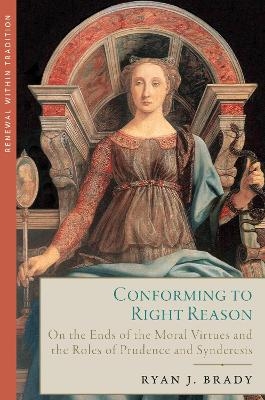
Conforming to Right Reason
On the Ends of the Moral Virtues and the Roles of Prudence and Synderesis
Seiten
2022
Emmaus Academic (Verlag)
978-1-64585-162-2 (ISBN)
Emmaus Academic (Verlag)
978-1-64585-162-2 (ISBN)
- Titel z.Zt. nicht lieferbar
- Versandkostenfrei innerhalb Deutschlands
- Auch auf Rechnung
- Verfügbarkeit in der Filiale vor Ort prüfen
- Artikel merken
How do the intellect and will remain free while pursuing a life of virtue? This is where the question of prudence comes in. Is the practical wisdom of the prudent man founded upon some kind of innate or acquired instinct, or does it presuppose understanding of intellectually grasped basic principles? And if those principles are presupposed, is reason necessary for applying them in any given instance, or can one solely look to the rightly formed appetites acquired by moral virtue?
In answering these questions, Ryan J. Brady looks first and foremost to St. Thomas Aquinas and his ancient and modern interpreters. Brady's way of engaging the question of the interplay between the intellect and reason is by focusing on two apparently conflicting texts of St. Thomas Aquinas, one of which says that synderesis (the habit of the first principles of the practical intellect) appoints the end to the moral virtues and another which says prudence does. The author's conviction is that the correct way of reconciling the two texts not only establishes knowledge of the role of conscience, virtue, and natural law in the moral life but also provides insight into the profoundly complementary roles of reason and will within the context of a life of virtue.
In answering these questions, Ryan J. Brady looks first and foremost to St. Thomas Aquinas and his ancient and modern interpreters. Brady's way of engaging the question of the interplay between the intellect and reason is by focusing on two apparently conflicting texts of St. Thomas Aquinas, one of which says that synderesis (the habit of the first principles of the practical intellect) appoints the end to the moral virtues and another which says prudence does. The author's conviction is that the correct way of reconciling the two texts not only establishes knowledge of the role of conscience, virtue, and natural law in the moral life but also provides insight into the profoundly complementary roles of reason and will within the context of a life of virtue.
Ryan J. Brady holds a doctorate in Moral Theology from Ave Maria University and teaches at Thomas Aquinas College in Santa Paula, California, where he resides with his wife Rebecca and three children. Previously, he served as the Chair of the Philosophy and Theology departments at St. John Vianney College Seminary. His articles have appeared in Nova et Vetera and Angelicum. He has also translated several works of St. Thomas Aquinas as part of the Aquinas Institute's Opera Omnia series.
| Erscheinungsdatum | 21.03.2023 |
|---|---|
| Reihe/Serie | Renewal Within Tradition |
| Sprache | englisch |
| Maße | 152 x 229 mm |
| Gewicht | 521 g |
| Themenwelt | Geisteswissenschaften ► Philosophie ► Philosophie des Mittelalters |
| Religion / Theologie ► Christentum ► Kirchengeschichte | |
| ISBN-10 | 1-64585-162-1 / 1645851621 |
| ISBN-13 | 978-1-64585-162-2 / 9781645851622 |
| Zustand | Neuware |
| Haben Sie eine Frage zum Produkt? |
Mehr entdecken
aus dem Bereich
aus dem Bereich
von Athanasius bis Gregor dem Großen
Buch | Softcover (2024)
C.H.Beck (Verlag)
12,00 €
eine Geschichte der christlichen Kunst
Buch | Hardcover (2024)
C.H.Beck (Verlag)
32,00 €


